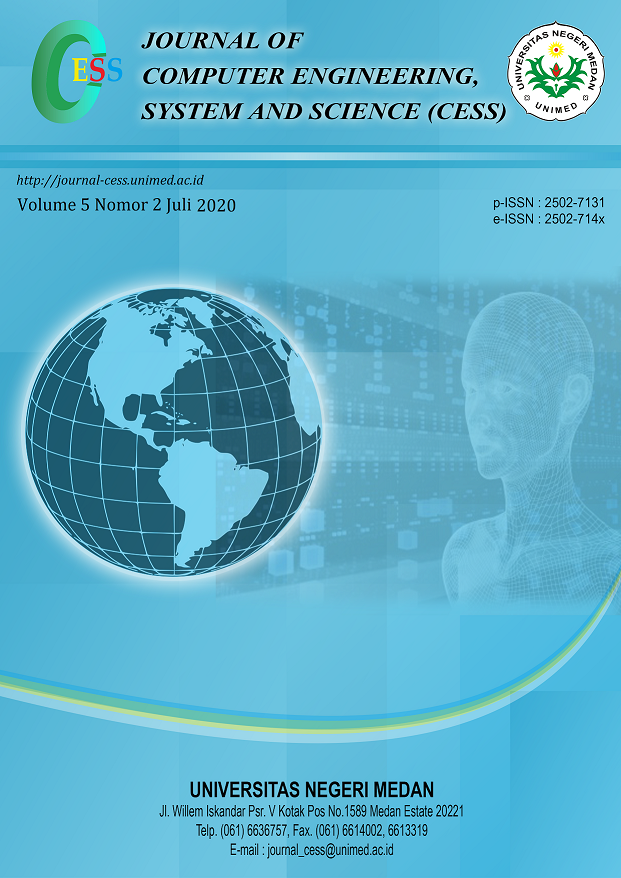Analisis Sentimen Zoom Cloud Meetings di Play Store Menggunakan Naïve Bayes dan Support Vector Machine
DOI:
https://doi.org/10.24114/cess.v5i2.18186Keywords:
Zoom Cloud Meetings, Google Play Store, Corona Virus, Naïve Bayes, Support Vector MachineAbstract
Aplikasi zoom cloud meetings yang mulai booming digunakan sekarang ini karena adanya pandemi virus corona, sehingga membuat semua kegiatan dilakukan secara virtual. Zoom cloud meetings merupakan aplikasi yang memiliki berbagai fitur termasuk video & audio conference. Pada penelitian ini penulis menggunakan metode Naïve Bayes dan Support Vector Machine dalam menganalisa label sentimen positif atau negatif pada ulasan para pengguna aplikasi zoom di Google Play Store. Jumlah dataset setelah prepocessing menjadi 1.007 record. Data hampir seimbang dengan label positif sebanyak 546 dan label negatif 461 ulasan. Evaluasi model menggunakan 10 fold cross validation diperoleh nilai akurasi dan nilai AUC dari masing-masing algoritma yaitu untuk NB nilai akurasi = 74,37% dan nilai AUC = 0,659. Sedangkan untuk algoritma SVM nilai akurasi = 81,22% dan nilai AUC = 0,886. Dalam penelitian ini dapat diketahui bahwa tingkat akurasi yang didapatkan algoritma Support Vector Machine (SVM) lebih unggul 6,85% dibandingkan algoritma Naïve Bayes (NB). Kata Kunci” Zoom Cloud Meetings, Google Play Store, Virus Corona, Naïve Bayes, Support Vector Machine. Abstract” Zoom cloud meetings application that began to boom is used today because of the corona virus pandemic, so that all activities are carried out virtually. Zoom cloud meetings is an application that has various features including video & audio conferencing. In this study the authors used the Naïve Bayes method and Support Vector Machine in analyzing positive or negative sentiment labels on the zoom users' reviews on the Google Play Store. The number of datasets after prepocessing is 1,007 records. The data is almost balanced with 546 positive labels and 461 negative labels. Evaluation of the model using 10 fold cross validation obtained accuracy values and AUC values from each algorithm, namely for NB, the accuracy value = 74.37% and the AUC value = 0.659. As for the SVM algorithm the accuracy value = 81.22% and the AUC value = 0.886. In this study it can be seen that the accuracy obtained by the Support Vector Machine (SVM) algorithm is 6.85% superior to the Naïve Bayes (NB) algorithm.Downloads
References
T. Dewayani, œBekerja dari Rumah (Work From Home) Dari Sudut Pandang Unit Kepatuhan Internal, Kanwil DJKN Jawa Barat, 2020. [Online]. Available: https://www.djkn.kemenkeu.go.id/artikel/baca/13014/Bekerja-dari-Rumah-Work-From-Home-Dari-Sudut-Pandang-Unit-Kepatuhan-Internal.html.
Zoom, œZoom Solutions, Zoom Video Communications, Inc, 2020. https://zoom.us/.
S. A. Saputra, D. Rosiyadi, W. Gata, and S. M. Husain, œAnalisis Sentimen E-Wallet Pada Google Play Menggunakan Algoritma Naive Bayes Berbasis Particle Swarm Optimization, J. Resti, vol. 3, no. 3, pp. 377“382, 2019.
G. A. Buntoro, œAnalisis Sentimen Calon Gubernur DKI Jakarta 2017 Di Twitter, Integer J., vol. 2, no. 1, pp. 32“41, 2017, [Online]. Available: https://www.researchgate.net/profile/Ghulam_Buntoro/publication/316617194_Analisis_Sentimen_Calon_Gubernur_DKI_Jakarta_2017_Di_Twitter/links/5907eee44585152d2e9ff992/Analisis-Sentimen-Calon-Gubernur-DKI-Jakarta-2017-Di-Twitter.pdf.
A. Fauzi, A. N. Rais, M. F. Akbar, and W. Gata, œAnalisis Sentimen Berinternet Pada Media Sosial AMIK BSI Tegal Dengan Menggunakan Algoritma Naive Bayes, in Seminar Nasional Teknologi Informasi Universitas Ibn Khaldun Bogor, 2018, pp. 46“54.
I. Santoso, W. Gata, and A. B. Paryanti, œPenggunaan Feature Selection di Algoritma Support Vector Machine untuk Sentimen Analisis Komisi Pemilihan Umum, J. Resti, vol. 3, no. 3, pp. 364“370, 2019.
B. Pratama et al., œSentiment Analysis of the Indonesian Police Mobile Brigade Corps Based on Twitter Posts Using the SVM And NB Methods, J. Phys. Conf. Ser., pp. 1“12, 2019, doi: 10.1088/1742-6596/1201/1/012038.
S. Kurniawan, W. Gata, D. A. Puspitawati, N. Nurmalasari, M. Tabrani, and K. Novel, œPerbandingan Metode Klasifikasi Analisis Sentimen Tokoh Politik Pada Komentar Media Berita Online, J. Resti, vol. 3, no. 2, pp. 176“183, 2019.
N. Nurajijah and D. Riana, œAlgoritma Naïve Bayes, Decision Tree, dan SVM untuk Klasifikasi Persetujuan Pembiayaan Nasabah Koperasi Syariah, J. Teknol. dan Sist. Komput., vol. 7, no. 2, pp. 77“82, 2019, doi: 10.14710/jtsiskom.7.2.2019.77-82.
F. N. Azzam, D. P. Kartikasari, and F. A. Bakhtiar, œImplementasi Video Conference dengan File Sharing menggunakan WebRTC, J. Pengemb. Teknol. Inf. dan Ilmu Komput., vol. 3, no. 10, pp. 10102“10109, 2019, [Online]. Available: http://j-ptiik.ub.ac.id.
RapidMiner, œRapidMiner Studio 9.6, RapidMiner, 2020. https://my.rapidminer.com/nexus/account/index.html#downloads.
B. Gunawan, H. S. Pratiwi, and E. E. Pratama, œSistem Analisis Sentimen pada Ulasan Produk Menggunakan Metode Naive Bayes, J. Edukasi dan Penelit. Inform., vol. 4, no. 2, pp. 113“118, 2018, doi: 10.26418/jp.v4i2.27526.
H. Hermanto, A. Mustopa, and A. Y. Kuntoro, œAlgoritma Klasifikasi Naive Bayes Dan Support Vector Machine Dalam Layanan Komplain Mahasiswa, JITK (Jurnal Ilmu Pengetah. dan Teknol. Komputer), vol. 5, no. 2, pp. 211“220, 2020, doi: 10.33480/jitk.v5i2.1181.
Downloads
Published
How to Cite
Issue
Section
License
Copyright (c) 2020 Nuraeni Herlinawati, Yuri Yuliani, Siti Faizah, Windu Gata, Samudi

This work is licensed under a Creative Commons Attribution 4.0 International License.















